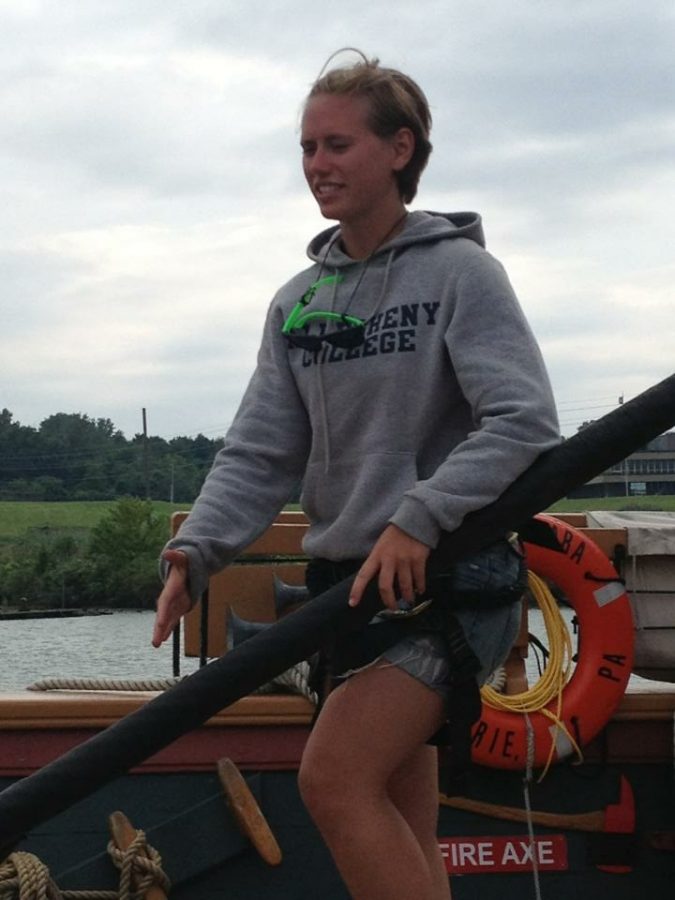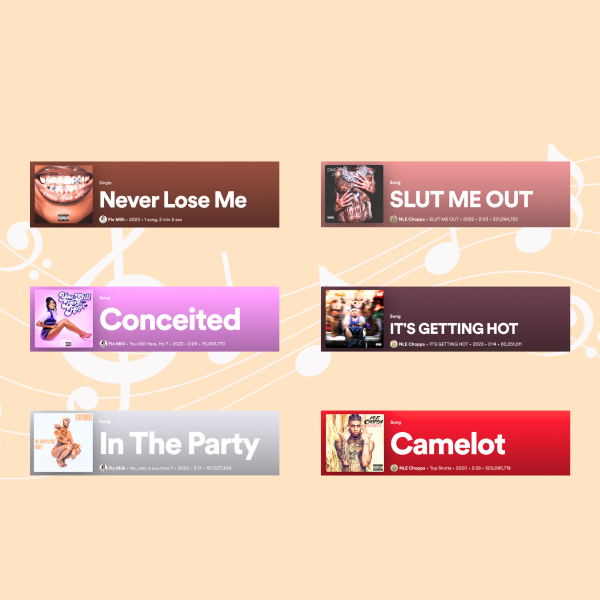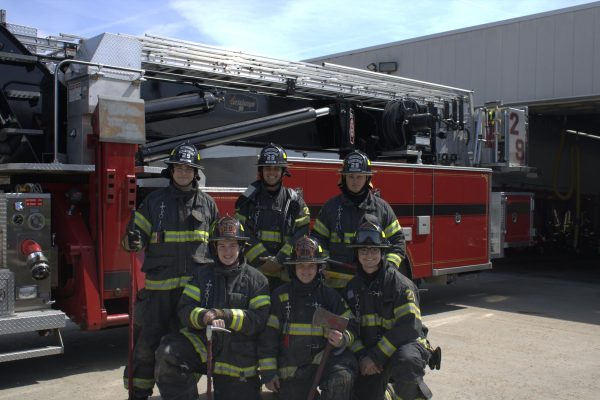EL Seminar helps alumna find herself aboard the USS Niagara
Hope Collins, ’15, is an Allegheny graduate who went on an experiential learning trip aboard the USS Brig Niagara from June 12 until July 3, 2013. Collins worked her way up from a trainee to an apprentice and then to an ordinary seafarer. She continued working on the Niagara after graduation. Although her contract ended this past October, she plans to continue writing about her experience aboard the Niagara.
The Campus: What were you involved in while at Allegheny?
Collins: I did Orchesis for all four years that I was there, so I was pretty involved with dance in the fall. I did dance team my senior year [of college]. I majored in English non-fiction writing, so I was also the Single Voice Reading Series assistant to Professor [Christopher] Bakken. I would help get stuff ready when the writers would come. I was also the English department student representative, so I would go to meetings with faculty. It’s a small school, so you’re kind of involved with everything all the time.
Campus: How did you start working on the USS Brig Niagara?
Collins: When I was a freshman, I saw a flyer for it, and I ran home to my roommate. I’m kind of outdoorsy, and I like doing stuff with my hands and being outside. She’s a little bit more indoorsy, so I ran home and was like, “Look what you can do.” She was like, “You have to sleep in a hammock.” I was super excited, and I went to all of the informational meetings. I didn’t actually apply until my sophomore year, and I went on a day sail and was so terrified because it was raining and rolling a little bit. By the end I was like, “I have to do this.” At that time, I was still a fiction major and I wanted to write about ships, so this was perfect. It was the cheapest EL [seminar]. I didn’t even have to go out of the country. I just had to drive to Erie. So I applied, and Professor [Ian] Binnington emailed me first and was like, “Please stop emailing me. You got into this program.” I did it for three weeks and it was so incredible. It felt like my life got shook up and then turned upside down and then put back down again. The captain was like, “Come back as an apprentice,” which is when you’re not paying to be there, but they’re not paying you to be there. You just go to learn. I came back as an apprentice the next year and that was awesome. I decided to write my comp about it because I had all of these stories, and I wanted to be able to tell people about this cool thing that I did because —especially at Allegheny—it seems like people don’t really know about this program. I think it’s because it’s listed as a separate EL on the website, so I want to work on letting people know that this is an option they have. It’s not for everybody, but for the people it is for, it’s really life-changing and rewarding. I worked there from May 2015, and my contract ended this month.
Campus: So you are not working aboard the boat anymore?
Collins: No, I’m not technically working on the boat, but I am hoping to go to grad school to continue writing about it. Hopefully, I can actually publish a book about it. I’m not working there, but I’m not done with it.
Campus: What about working there made you want to stay?
Collins: There’s really nothing else like it. You’re literally living with forty other people. As a trainee, you show up, and you’re really soft and scared. Everybody’s yelling a lot. You don’t really understand how the sails work, and it’s interesting to work up from a trainee to someone who’s doing the yelling at people. You’re super fit, super tan and super blonde. Everybody’s really attractive, and you get to work with these people who are really motivated and have a different set of thinking. Everybody’s done really interesting things. Really what made it for me is the people because everybody there is really cool and really motivated and so smart. They know exactly what they’re doing, and you just want to keep being around these people. It’s like you’re finally sitting at the cool kids’ table. You conquer one thing and you get to move up. You just keep getting to be better. It’s really affirming. You tell people about this and you’re suddenly the coolest person in the room.
Campus: Do you have a favorite memory from working on the Niagara?
Collins: There’s so many. I saw the Milky Way for the first time on the ship. That was pretty neat. This summer we were all at karaoke. There was a bunch of sailors there, and Bob Marley’s “Redemption Song” was playing which I had never heard before. I was like, “This is a great song.” The captain came over and was like, “You’re going to have such a withdrawal from this in six months. You’re going to be so sad.” I was looking around, and everybody was singing. Just looking around at the faces of everybody I had gotten to know. Everybody was singing and having a good time, and I was having a moment.
Campus: What is one of the hardest things about working on the Niagara?
Collins: Sleep deprivation because you sleep for four hours and work for four hours. You might get to sleep for six, but you get woken up in the middle of it to eat. It’s really hard labor. It’s not for the faint of heart. You’ve got to be working all of the time. After a whole summer of that, you’re like, “I’m exhausted.” It’s worth it, but everybody’s really tired, and that’s when people start making mistakes. It’s just stuff you’ve got to look out for, but the hardest part is definitely how worn out you get and being away. But both of those you get used to after a while, so it’s not a problem, just something that you’ve got to deal with.
Campus: What is the best thing about working on the Niagara?
Collins: The best thing is the people. I think it’s because they’re people like me. I found people who understand the way I think about stuff. You want to be like these people, and you want them to like you. You get to see really cool stuff. You get to go out in the middle of a lake and look at the stars, and it’s more stars than you ever knew existed.
Campus: What lessons have you learned through this experience?
Collins: I learned how to be nicer to myself. It took me a long time to have patience with how I learn things. I learned a whole lot about myself—what it’s like to work with other people, what it means to be a good co-worker and a good person to work with. I learned that it’s okay to fail, it’s okay to make mistakes and you can’t stop trying. I would be so afraid of messing up that I wouldn’t even try. It’s not one big lesson you learn, but you get to meet yourself. You get to encounter what kind of person you want to be and what kind of person you are.
Campus: Do you have any advice for college students who do not know what they want to do after graduation?
Collins: Don’t worry about it. It’ll come to you. Don’t worry about money. Just keep doing what makes you happy, what fills you up at the end of the day and what makes you feel like a contributing member. The rest will come after that. Just do what you want, do what you love and it will be okay. Also, please sleep.







